Green Spaces in Urban Places
We are a Manchester-based social enterprise, founded in 2009, to help urban communities create greener cities and connect with nature.
We believe the importance of green spaces in cities cannot be overstated. They helps to reduce flooding, tackle climate change, and improve air quality. Plus, green spaces support our health and wellbeing, and provide opportunities to strengthen communities.

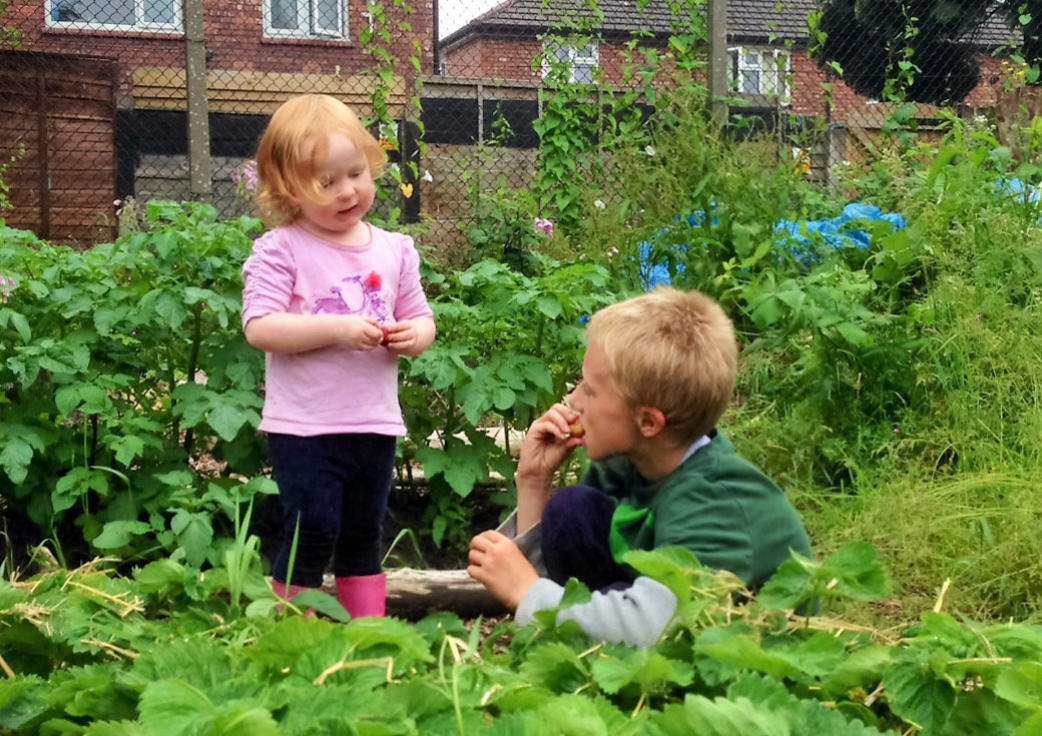
We empower communities to transform derelict and unused land into thriving community greenspace, tackling inequality, and delivering projects that provide practical green skills.
We partner with grassroots groups, community gardens, businesses, and organisations to create a movement of people and organisations that care about nature in cities. We have a unique approach uniting landscape design practice with staff experience in urban agriculture, horticulture, green infrastructure, ecology, community development, health promotion, and urban regeneration. All our work is underpinned by the need to tackle climate change and support the 17 UN sustainable development goals.
Our vision
It’s a challenging time for people and nature, especially in our cities. Inequality is rising, climate change is causing more extreme and unpredictable weather events, and an increasing number of people are experiencing food poverty.
Individuals and organisations are already trying to make a difference, but we must do much more to make cities sustainable places to live. Imagine a city that weaves nature into its very core. Where everyone can access natural places, where urban farming is the norm, and where biodiversity doesn’t just survive, it thrives.
We’re working every day to make this happen.
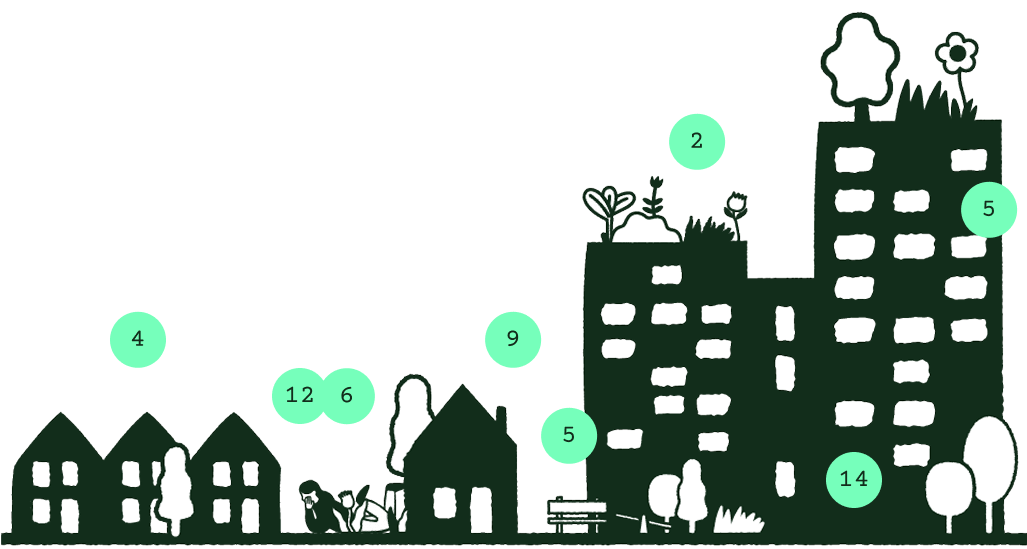
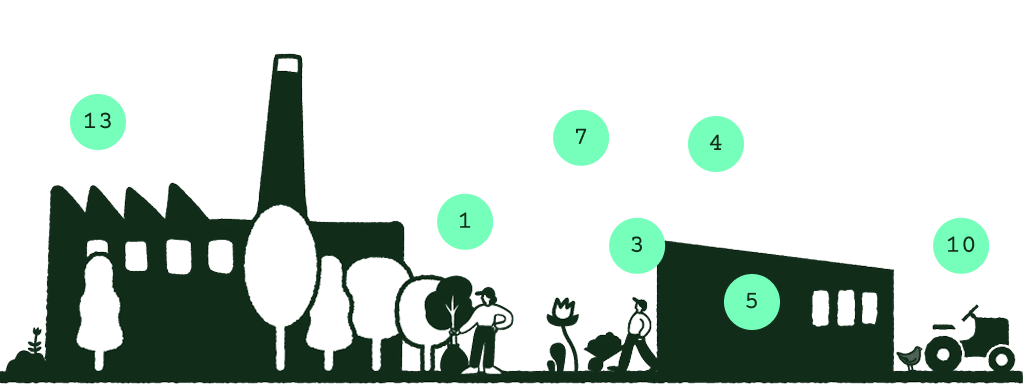
- 1
Street trees, providing shade, habitats and reducing air pollution and flood risk.
- 2
Green roofs provide space for food growing, and reducing the urban heat island effect.
- 3
Jobs created through food enterprise.
- 4
Investment in green infastructure.
- 5
Parks used relaxation and socialising.
- 6
Community gardens created to provide local food reducing food related carbon emissions.
- 7
Protecting urban soil to improve its quality.
- 8
Schools, hospitals and GPs used for food growing.
- 9
Unused land repurposed for food production.
- 10
Urban farms used to provide seasonal food .
- 11
Good quality domestic green spaces.
- 12
Community gardens are used as social spaces, creating stronger communities.
- 13
Blue infrastructure created to provide key habitats.
- 14
Connected green spaces encourage wildlife movement, supporting biodiversity.
What matters to us

Empowering communities to create green spaces in urban places
We empower communities to transform derelict and unused land into thriving community greenspace, tackling inequality, and delivering programs that enrich learning, and promote wellbeing. We work shoulder to shoulder with local people to create spaces for nature and food growing.
Contact us to arrange a free, no obligation quote for design and landscaping services.

Connecting people in cities with the living world.
We believe everyone in cities should be connected with nature, particularly the most disadvantaged and underserved communities in Manchester, with the least access to greenspace.
City dwellers in increasingly dense urban areas may have little or no connection with the natural world. A third of people in the UK do not have access to good quality green and blue spaces within a 15-minute walk of their home.
We provide nature-based activities to help reconnect urban populations with the living world. Through nature crafts, foraging walks, and community gardening we can rediscover and deepen our connection with the natural world.
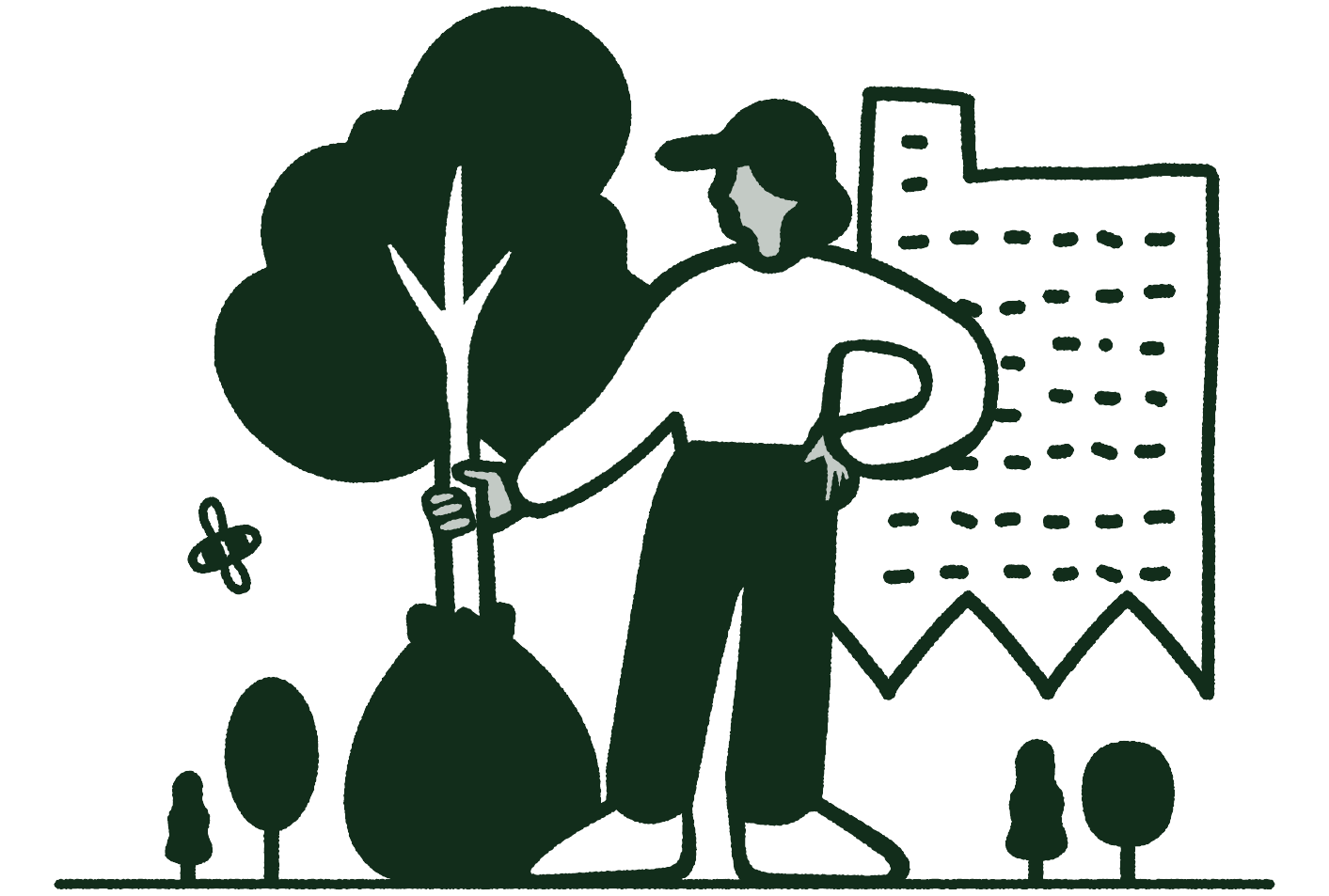
Championing the importance of nature in cities
At a local, regional, and national level, Sow the City champions the importance of nature in cities. We have been campaigning for over a decade to strengthen environmental, health, and food policy, helping to mainstream urban biodiversity and food production. Cities are responsible for over 70% of global greenhouse gas emissions, and 75% of resource use. In their scale and complexity, cities show how ingenious humanity can be. But we need to rethink how they are designed and reduce their environmental impact. Unused and derelict urban land has the potential to be transformed into new greenspaces, with multifunctional benefits.
Natural environments elicit greater calming responses than urban environments and viewing nature for just 20 minutes has been shown to reduce stress hormone levels.
Accessible urban green spaces encourage physical exercise, which can reduce heart disease risks and chronic diseases. Being in nature has also been shown to boost our immune systems. Green spaces are communal spaces, providing space for social cohesion. Public Health England has estimated that £2.1 billion in health costs could be saved per year in health costs if everyone had good access to greenspace.
Green spaces in cities can help reduce air pollution, which is essential as in Greater Manchester toxic air is the largest environmental cause of poor health, contributing to 1,200 deaths per year.
Creating new green spaces or improving existing green spaces helps to create, restore and connect habitats, boosting biodiversity. Flowers and fruit/vegetable plants provide food sources for pollinators such as bees, butterflies and hoverflies, which play a crucial role in plant reproduction.
Cities are predominantly made up of concrete buildings and roads that are impermeable and encourage surface water run-off, however, the vegetation helps to reduce flood risk, by slowing rainwater runoff and absorbing excess water.

Working in partnership with others to achieve the best results for nature.
We believe in building networks between individuals, the community, and other organisations.
A collaborative approach helps us to scale up, reach wider audiences, and create a movement of people and organisations that care about nature in cities. These partnerships help us to share expertise, information, and resources, which will harness a more impactful results for the environment than working alone.
Our people
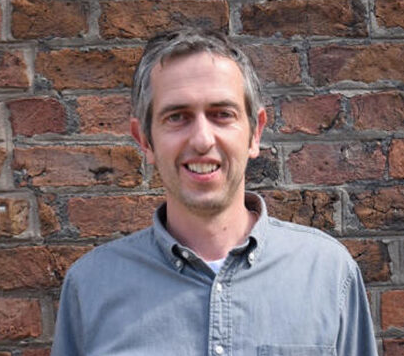
Jon Ross
Founder & Chief Executive, He/Him
Born and raised in Manchester, Jon knows a lot about the soil in this part of the country. Having graduated with a masters in environmental management, he began his career at WSP Environmental doing contaminated land and corporate social responsibility work.
He then worked for Transport for Greater Manchester delivering projects including the Rochdale Bus Station Hydroelectric Power Scheme, the Greater Manchester Climate Change Strategy, and he was lead person for biodiversity for the transport authority.
Jon founded Sow the City with just a few bags of compost in 2009. Since then he has steered the social enterprise into an award winning organisation.
Jon is passionate about the potential for nature to improve his home town and loves to grow his own veg when he’s not helping other people do the same.
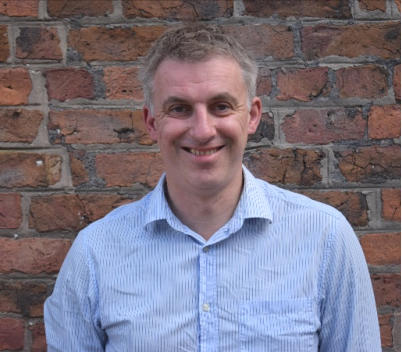
Kieron McGlasson
Director, He/Him
Having grown up in the Lake District under the guidance of his Dad, a landscape gardener, Kieron has always thought it normal to grow your own food. After moving to Manchester for university, Kieron spent nine years in the regeneration sector at BDP delivering high profile projects. These often centred on the community engagement and sustainability elements of a city plan or neighbourhood strategy. Kieron then worked for two years in the social enterprise sector helping to build healthier communities in Salford.
Joining Sow the City in 2014 has allowed Kieron to combine his roots, experience and personal interests with a career across the public, private and social enterprise sectors. His work combines his passions for food growing, his environmental conscience and his work in community development to create a happier, healthier city.
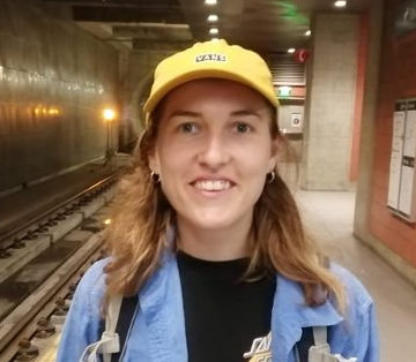
Emily Corner
Operations Manager, She/Her
Emily joined Sow the City as a Project Manager in 2018, where she has been able to steadily develop a broad skillset working on a variety of community growing and greening projects across GM. Emily became Operations Manager in 2023, focusing on overarching support of our delivery team and the monitoring of organisational operations.
She has also worked for The Conservation Volunteers and City of Trees in Manchester, 2014, followed by working in the Community Garden Makers team at Newground CIC across Lancashire in 2015.
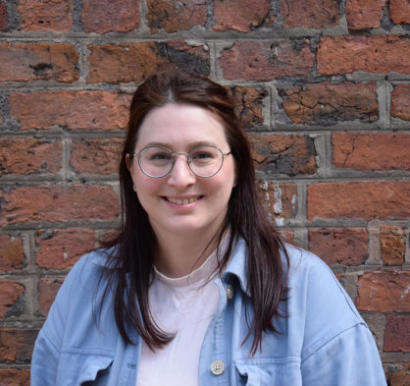
Catherine Clarke
Project Co-ordinator, She/Her
Catherine comes to Sow the City with over 12 years spent working in the environmental sector, initially starting her career as a volunteer with the Yorkshire Wildlife Trust (YWT) supporting delivery of an urban food growing project and learning practical growing skills on a community farm. This was then followed by further project and event work with YWT on nature reserves and for the last 6 years delivering environmental education with the RSPB to connect children and families with nature.
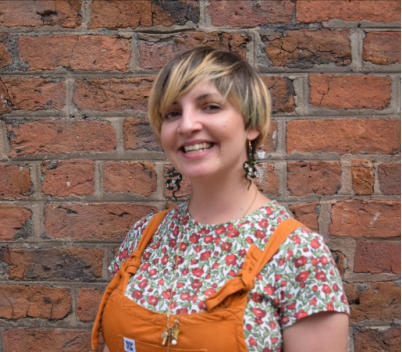
Laura Weaver
Assistant Manager the Boiler House, She/Her
Laura was born and raised in Staffordshire and has always had a passion and connection to nature. She became an adopted Mancunian in 2012 when she came to Manchester to study Fine Art. Since leaving university Laura has been involved with projects with Blaze Arts and Step Up, which is where she found her passion for running art sessions and bringing creativity to communities. Laura joined in June 2021 and is the Link Worker for our Nature for Health project whilst also acting as Assistant Building Manager for the Boiler House.
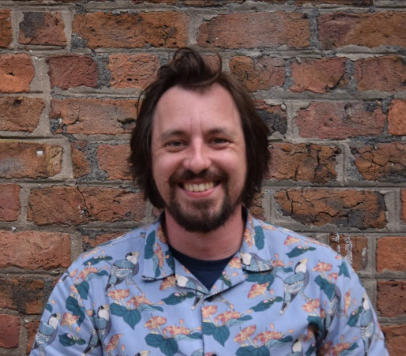
Ciarán McLoughlin
Project Co-ordinator, He/ Him
Born in Liverpool and raised in Cheshire, Ciarán comes from a long line of gardeners and plant enthusiasts. In his professional life, he has worked in primary education for approximately 10 years supporting children with special educational needs and disabilities (SEND).
Ciarán leapt at the chance to join the Sow the City team when the opportunity arose and is employed as a community grower, supporting various schools, groups, and associations throughout Greater Manchester. In his spare time Ciarán can be found tending his own allotment in Blackley, North Manchester, where he lives with his wife, dog and three cats.
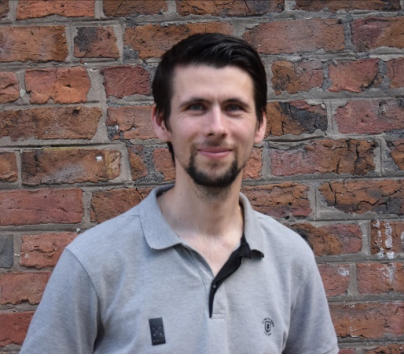
Ladislav Maluch
Site Transformation Team Lead, He/ Him
Lad comes from the Slovakian countryside where he acquired a great wealth of skills in horticulture, market gardening and commercial growing. Having lived in Manchester for over 10 years Lad has been working on improving the mental health and wellbeing of local communities using nature, food growing, foraging. Besides a strong passion for fungi and anything fungi related Lad also enjoys site transformation build projects.

Lucy Moore
Project Co-ordinator and communications
Lucy grew up in London, but has lived in Manchester for seven years, where she has developed her interest in human environment interactions, through studying Geography and a Masters in Green Infrastructure, at the University of Manchester. Lucy’s placement at the social enterprise ‘Urban Growth’ contributed to her appreciation of the beneficial impact of nature on wellbeing. Lucy is passionate about urban greening at both the community and city scale.
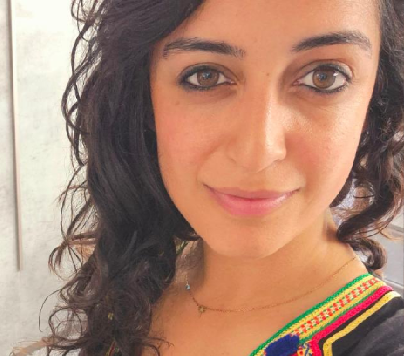
Hafsa Omar
Project Co-ordinator, She/ Her
Hafsa has a keen interest in community engagement, applying her experience and knowledge working with charities, social enterprises and grassroots organisations to help make their services more accessible to marginalised groups. More recently, she has experience working in the environmental industry where she was able to apply her 6 years in the education sector to help guide residents on how they can mitigate climate change on a localised level and raising awareness on how this could improve their quality of life.
Hafsa moved to the UK at a young age and has lived in a number of different countries, towns and cities but has chosen Manchester as her home for the past 17 years. She’s passionate about bringing the joy of nature to her local community in Moss Side and around Manchester.
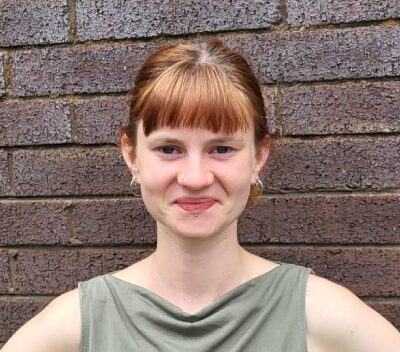
Anastasia Wlaschin-Wiest
Project Co-ordinator, She/ Her
Anastasia grew up learning about nature and gardening from her grandfather in the US, and moved to the UK at age 11 with her family. She travelled around a bit before settling in Manchester in 2021. She is a keen forager and nature lover, with a degree in conservation genetics from the University of Glasgow, and a masters in International Environmental Law from Utrecht. She is passionate about community building, as well as environmental and social justice. In her spare time enjoys reading books, climbing, and hanging out with friends and her cats.
Non-Executive Directors

Sian Thomas
Non-Executive Director, She/Her
Sian is a transnational education specialist with extensive senior leadership experience across vocational and higher education pathways, awarding bodies, and charitable organisations. She holds an MA in Development Education from UCL and is expert in sustainable partnerships, teaching, and quality oversight. Her commercial leadership background includes strengths in programme development, revenue generation, governance, and strategic stakeholder engagement. As a technical education consultant across LI, MI, and HI regions, she specialises in vocational-HE partnerships, refugee provision, lifelong learning, and embedding skills for sustainability.

Sue Benson
Non-Executive Director, She/Her
Sue began her career at M&S before becoming New Business Director at McCann Erickson Manchester, leading major brand campaigns. In 2006, she founded The Market Creative, now The Behaviours Agency, with a focus on behavioural science-led creativity for clients like Amazon Fresh and Auto Trader. She’s a passionate leader whose company holds both Investors in People Gold and B-Corp status. Sue plays an influential role in the industry as IPA city head for Manchester, board advisor, and women’s network founder. Outside of work, she enjoys time with her daughter Lily, coastal getaways, gardening, and keeping active.

Adrian Smith
Non-Executive Director, He/Him
Adrian works in the NHS in Trafford where he supports place-based improvements in health and wellbeing. His background is in public health, community development, and system leadership. He has over 25 years of experience delivering strategic initiatives across NHS, VCFSE, and local authority sectors. He has successfully embedded neighbourhood structures, championed inclusive service redesigns, and secured innovation funding for award-winning population health programmes. Adrian is known for his collaborative leadership style and ability to build trusted partnerships that improve outcomes and reduce health inequalities. He is a passionate advocate for co-production, community voice, and creating high-trust, high-impact systems of care.
Advisors

Pete Coventry
Professor of Health, Environment, and Society at Manchester Metropolitan University, He/Him
Pete is from Salford and rooted in city living and grew up understanding the role green places play in a healthy life. He is Professor of Health, Environment and Society at Manchester Metropolitan University. With training in the social sciences, humanities, and applied health sciences Pete works as an interdisciplinary researcher at the intersections of public health, mental health, and environmental sustainability. He has led research programmes on nature and heritage-based interventions and how these approaches can support sustainable models of health and social care. His work supports partnerships between universities, the NHS, and the VCSE sector. Pete brings expertise in evaluation of mental health interventions using evidence synthesis, experimental, and qualitative methods. He’s committed to creating knowledge about the role of green spaces and nature-based interventions to improve health, strengthen communities, and build climate-resilient cities.
Awards
We are proud of the work we do and the communities we work with. We have even won some awards!
- Queen’s Award for Voluntary Service 2020
- Spirit of Manchester Business Citizenship Award 2017
- Northern Enterprise 2016 Health and Wellbeing Category Award Winners.
- Silver Show Garden award at Dig the City 2015 for our Growing Manchester “Tales from the Plot” installation.
- Shortlisted in the Manchester Evening News Environment Awards 2014 Environment and Health Project category.
- Highly commended in the Social Enterprise North West Awards 2013 Environmental Excellence category.
Press coverage
- BBC World Service
How safe is the soil in our cities?
Listen here - About Manchester
First shoots of Nature Takeover appear in Moss Side as part of city-wide programme (Jun 2021)
View here - Bury Times
New ‘green health’ walk is launched by Prestwich Hospital (May 2021)
View here - iNews
“How to get involved in saving the planet right now – in your own back yard” (Sep 2019)
View here - About Manchester
Moss Side Repair Café and Longsight project lead the way in raising awareness of sustainability (Sep 2019)
View here - Bury Times
Disused plot turned into thriving garden at heart of Springs estate (Sep 2019)
View here - Fast Company (US)
Doctors are now prescribing houseplants to help treat anxiety and depression (Sep 2019)
View here - Manchester Evening News
Plants and herbs are being prescribed to patients suffering from anxiety, depression and loneliness at a GP surgery (Aug 2019)
View here - Manchester Wire
Free fixings: A Repair Café coming to Moss Side (May 2019)
View here - Rochdale News
How getting in touch with nature is helping young people to thrive (Dec 2018)
View here - Pennine Acute Hospitals NHS Trust
Green-fingered gardeners sow the seeds of success at North Manchester General Hospital (Sep 2018)
View here - Bury Times
Red Door celebrates new growing space for Bury’s homeless (Jul 2018)
View here